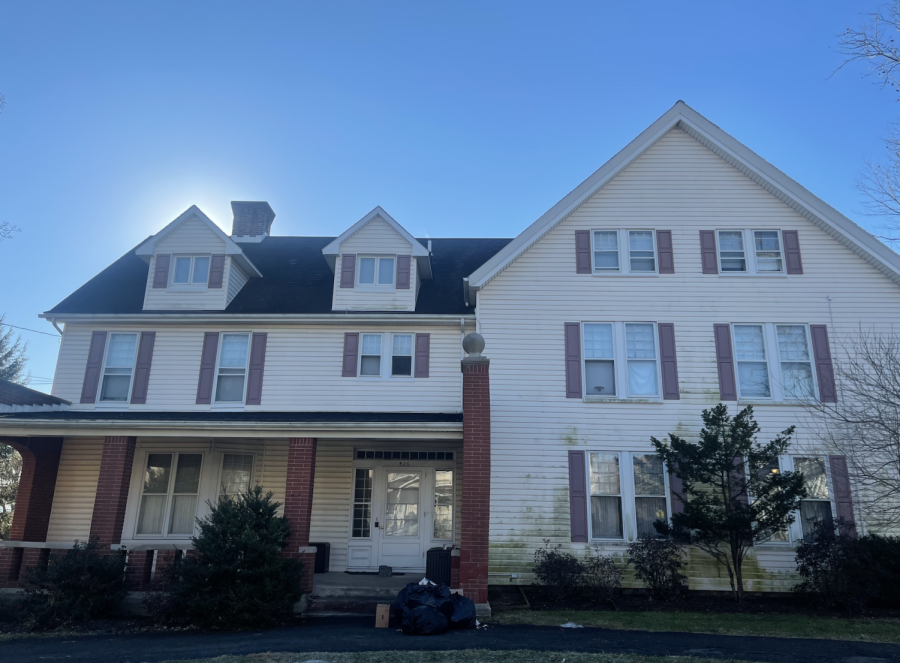College experiences first Covid outbreak of the semester
Some Covid-positive students are quarantining in the Weiss House, located on the corner of Cattell Street and Clinton Terrace. (Photo by Deanna Hanchuk ’22 for The Lafayette)
February 11, 2022
Three weeks into the semester, the college is experiencing its first major Covid outbreak of 2022, with over 120 cases reported between Monday and Wednesday.
Students who test positive are required by the college to isolate for at least five days. Students who are still symptomatic or who test positive on an antigen test after the fifth day remain in isolation, according to the college’s campus protocols for the semester.
Similar to previous semesters, housing for students in isolation is available in Weiss House and at a nearby hotel in Bethlehem. Students who live within two hours of campus and can safely return home “should plan to do so,” according to the protocols.
This semester’s outbreak does differ from past semesters, however. Vice President of Campus Life Annette Diorio explained that the college’s choice to test student on their sixth day after infection is consistent with updated CDC guidance.
Additionally, the college has added a daily shuttle service to the hotel for students needing to isolate there, KN95 masks in stock for students, faculty and staff and on-site PCR testing twice a week, according to Diorio.
Students were also required to receive a Covid booster prior to the Feb. 1 deadline.
“So far students are either asymptotic or experiencing mild symptoms so while our absolute number of cases is, of course, a concern, the outcomes for our students have been very good,” Diorio wrote in an email.
Close contacts identified for each Covid-positive student are contact traced through the Lehigh Valley Health Network and test at the Bailey Health Center. According to its protocols, the college is following the CDC definition of close contacts: “persons who have spent 15 minutes over a 24-hour period within six feet of a person who has tested positive for COVID-19 if that time occurred within two days prior to the positive COVID-19 test or onset of symptoms.”
Despite this week’s spike in cases, Diorio wrote that she is hopeful that cases will level off and drop next week.
“Currently, we are focused on managing the cases we are seeing and barring something unexpected…if they do not and we need to adjust isolation housing or dining options we will alert the community before doing so,” Diorio wrote.
She emphasized that faculty has been encouraged to use “professional judgment” about when their class reaches a point when moving it to remote status for a few days is in order.
“Faculty [are] notified in real time about students restricted from attending class and we hope they use that information, as opposed to total campus COVID data, to make decisions about individual courses,” Diorio wrote. “We have not received an unrealistic number of questions given the escalation in cases this week.”
The college’s Covid Dashboard is being updated every Tuesday and Friday. Diorio wrote that her team will continue to update the community regularly, “although daily updating of the COVID dashboard may not be the form the updates take.”
Alex Kasparian ’22, who is currently quarantining in the Weiss House after testing positive for Covid early Monday morning, said that she she felt that the school was not relaying enough information to students including a more regular reporting of the case count.
“Right now, it’s a big spike, and I kind of want to know,” she said.
Student Government has continued to host town halls on Covid protocols, as they did last fall. Tim Hugo ’22, director of the student services committee of student government, said they hope to “create a forum which fosters an honest dialogue between students and administration in regards to the college’s handling of COVID-19.”
Student Government President Flor Caceres ’22 explained that she has heard concerns about professors not having the right access to information and resources to pass the right information onto students. Additionally, she said she has heard concerns from students who feel unclear on isolation and quarantine policies or are fearful that they might be required to go to class by some professors if they don’t feel well.
The rate of Covid infections is dropping nationally, but as Lafayette demonstrates, is still causing pocket surges in certain states throughout the country.
Lucie Lagodich ’22 contributed reporting.


























































































































